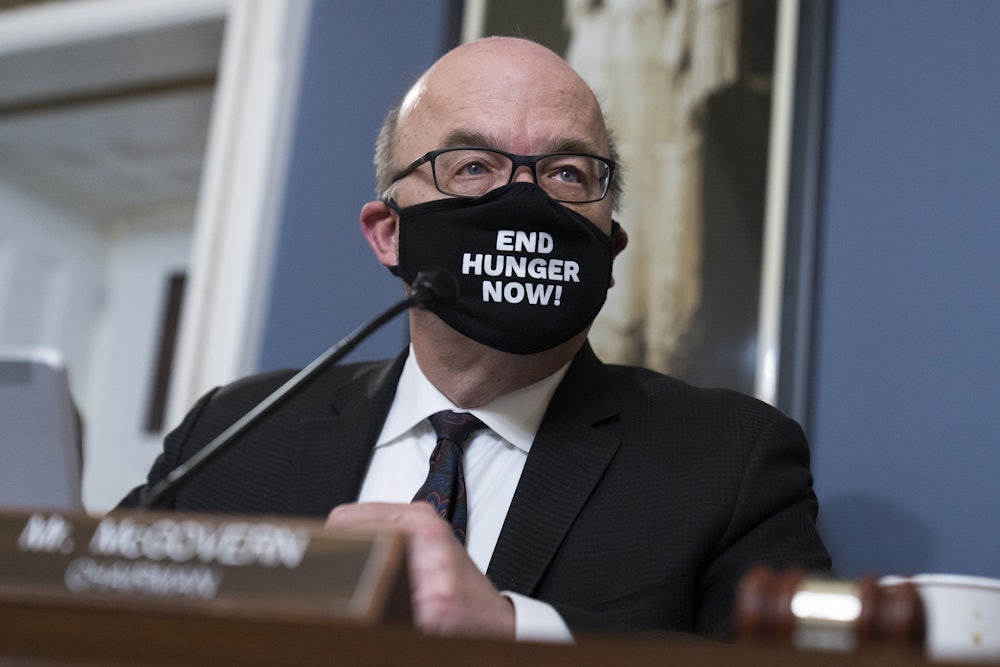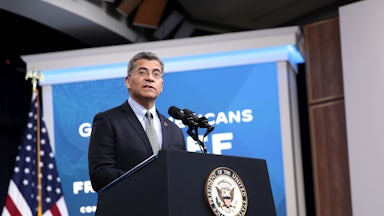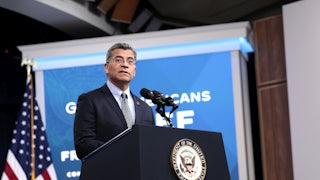In December 1969, President Richard Nixon convened a historic conference to address hunger and nutritional well-being, issues that had only recently risen to the national consciousness. That colloquy produced nearly 1,800 recommendations and has been credited with revitalizing the country’s food and nutrition policy. Its influence has been felt for a half-century, thanks to expansions of the food stamp and school lunch programs, as well as the creation of the Special Supplemental Nutrition Program for Women, Infants and Children, or WIC.
This was all part of the plan. “This meeting marks an historic milestone. What it does is to set the seal of urgency on our national commitment to put an end to hunger and malnutrition due to poverty in America,” Nixon pledged in his speech before the conference. “Our national conscience requires it. We must because we can.… This nation cannot long continue to live with its conscience if millions of its own people are unable to get an adequate diet.”
It took more than 50 years, and significant prodding from Congress, for another such conference to be held. But on Wednesday, the White House Conference on Hunger, Nutrition and Health convened, with President Joe Biden pledging to end hunger and increase healthy eating and physical activity by the end of the decade.
“I really do know we can do this: end hunger in this country by the year 2030 and lower the toll that diet-related diseases take on for too many Americans,” Biden said in a speech at the conference. “This goal is within our reach.”
Biden’s aims are ambitious, but then, so were the targets of the conference 50 years before. “The 1969 conference produced a lot of good things. But it took months and in some cases years to implement all of the policies and to reach the goals that were put forward,” Representative Jim McGovern, a longtime anti-hunger advocate in Congress who had lobbied hard for the conference, told me on Thursday. “All of this, to me, is a step in the right direction. But we have work yet to do.”
This year’s event gathered representatives from the private and public sectors, as well as government officials and members of Congress. Speakers included José Andrés—the famed chef and founder of the World Central Kitchen—and Eric Adams, the New York City mayor and vocal vegan. (Or pescatarian, depending on the day.)
On the eve of the event, the White House announced $8 billion in investments from the public and private sector to help combat hunger. According to a White House fact sheet, at least $2.5 million will be invested in start-up companies focused on finding solutions to hunger and food insecurity, while more than $4 billion will be “dedicated toward philanthropy that improves access to nutritious food, promotes healthy choices, and increases physical activity.” At the conference, companies came bearing financial commitments and plant-based creamers.
“I think everybody who attended the conference felt there was a strong commitment from the corporate sector,” said Luis Guardia, the president of the Food Research and Action Center, in an interview on Thursday morning. “The buzz around the room was, we’ve got to get moving, we’ve got to really strike while the iron’s hot.”
These “cross-sectoral” investments, as Guardia described them, include $20 million from the pharmaceutical company Novo Nordisk for programs that improve access to healthy foods and “safe spaces for physical activity” for marginalized communities; a new initiative by Instacart to incorporate SNAP and Temporary Assistance for Needy Families, or TANF, into its online platform; and $255 million from Tyson Foods for anti-hunger charities with a focus on rural and underserved areas. Guardia appreciated how the conference raised the fact that poverty is among the “root causes” of hunger and dietary diseases, and the recognition that expanded nutritional programs and the enhanced child tax credit helped to cut poverty dramatically during the pandemic.
Strengthening these programs is among the professed aims of the Biden administration. In a 44-page agenda providing a “national strategy,” the White House outlined some of its goals for ending hunger. Some steps can be taken solely by the administration—Senator Cory Booker, another participant in the conference, told me afterward that he was hoping the Food and Drug Administration would be “putting the F back in the FDA.”
Other goals were perhaps more idealistic: One paragraph in the national strategy agenda reads like a laundry list of the programs that Democrats were ultimately unable to pass last year in a massive social policy bill: a promise from Biden to work with Congress to “raise the minimum wage to $15 an hour; close the Medicaid coverage gap; invest in affordable, high-quality child care; and expand the Housing Choice Voucher program to ensure low-income families, older adults, and people with disabilities can afford decent, safe, accessible, and sanitary housing.”
Other aims included expanding access to free meals in schools, expanding SNAP eligibility, extending summer meal benefits to more children, and reinstating the enhanced child tax credit. Each of these targets would require congressional action, a heavy lift for a narrow Democratic majority with just months left in the year.
“This is an issue that should really be bipartisan,” McGovern told me. The Massachusetts congressman, who sported a mask emblazoned with the phrase “End Hunger Now” for much of the pandemic, began his political career working for Senator George McGovern. That senator—no relation to the congressman—was a staunch anti-hunger advocate, and Jim McGovern will speak warmly of his former boss’s work with the late Senator Bob Dole. “Their view was you don’t have to agree on everything, but agree on something, and they believed that food ought to unite us and that anti-hunger ought to unite us. And I’d like to think even in this polarized time, that we can find that place once again, here in Congress,” McGovern said.
Congress is leaving for several weeks after Friday; neither house will reconvene until November, after an election where Democrats are widely expected to lose control of one or both chambers in the House. If Republicans gain control of the House, it seems unlikely that they would act on Biden’s anti-hunger agenda; GOP Representatives G.T. Thompson and Virginia Foxx, the ranking Republicans on the committees that write food and nutrition legislation, had criticized the conference as partisan.
McGovern dismissively referred to Republicans who oppose taking action to improve nutrition as suffering from “I need my ass kissed–itis.” “For people who are just naturally skeptical or who just want to be naysayers, who don’t want to be involved in anything meaningful—they can talk to themselves,” he said.
However, there was a glimmer of bipartisan hope at the conference; GOP Senator Mike Braun of Indiana participated in the event. The late GOP Representative Jackie Walorski of Indiana had, alongside Braun, Booker, and McGovern, co-sponsored the resolution calling on the White House to hold such a conference. “On issues of hunger, health, nutrition—we as Republicans ought to be interested in that,” Braun told me on Thursday. “I was never going to sign off on the White House proposals just because I was a part of it, but I’m going to listen. And I think as Republicans, those are issues that we need to be involved with.”
It’s possible that some issues could be addressed during the lame-duck session of Congress, between the election and the end of the year. McGovern mentioned a bill that he and Walorski had previously worked on together creating a pilot program for Medicare to provide medically tailored meals. If the momentum of the White House conference is sustained, it could ease both congressional action and movement in the public and private sectors.
“One of the important outcomes of yesterday’s conference is that, I think, people walked away saying, ‘This is possible. This is doable,’” McGovern said.










